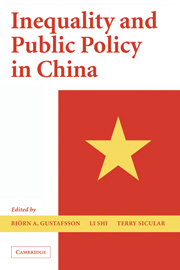Book contents
- Frontmatter
- Contents
- List of Tables and Figures
- Contributors
- Acknowledgments
- 1 Inequality and Public Policy in China: Issues and Trends
- 2 Income Inequality and Spatial Differences in China, 1988, 1995, and 2002
- 3 Growth and Distribution of Household Income in China between 1995 and 2002
- 4 Explaining Incomes and Inequality in China
- 5 The Distribution of Wealth in China
- 6 Growth, Inequality, and Poverty: A Comparative Study of China's Experience in the Periods before and after the Asian Crisis
- 7 What Has Economic Transition Meant for the Well-Being of the Elderly in China?
- 8 Inequity in Financing China's Health Care
- 9 China's Emerging Urban Wage Structure, 1995–2002
- 10 Unemployment, Earlier Retirement, and Changes in the Gender Income Gap in Urban China, 1995–2002
- 11 What Determines Living Arrangements of the Elderly in Urban China?
- 12 The Impact of Village-Specific Factors on Household Income in Rural China
- 13 The Redistributive Impact of Taxation in Rural China, 1995–2002: An Evaluation of Rural Taxation Reform at the Turn of the Century
- Appendix: The 1995 and 2002 Household Surveys: Sampling Methods and Data Description
- Index
- References
7 - What Has Economic Transition Meant for the Well-Being of the Elderly in China?
Published online by Cambridge University Press: 25 July 2009
- Frontmatter
- Contents
- List of Tables and Figures
- Contributors
- Acknowledgments
- 1 Inequality and Public Policy in China: Issues and Trends
- 2 Income Inequality and Spatial Differences in China, 1988, 1995, and 2002
- 3 Growth and Distribution of Household Income in China between 1995 and 2002
- 4 Explaining Incomes and Inequality in China
- 5 The Distribution of Wealth in China
- 6 Growth, Inequality, and Poverty: A Comparative Study of China's Experience in the Periods before and after the Asian Crisis
- 7 What Has Economic Transition Meant for the Well-Being of the Elderly in China?
- 8 Inequity in Financing China's Health Care
- 9 China's Emerging Urban Wage Structure, 1995–2002
- 10 Unemployment, Earlier Retirement, and Changes in the Gender Income Gap in Urban China, 1995–2002
- 11 What Determines Living Arrangements of the Elderly in Urban China?
- 12 The Impact of Village-Specific Factors on Household Income in Rural China
- 13 The Redistributive Impact of Taxation in Rural China, 1995–2002: An Evaluation of Rural Taxation Reform at the Turn of the Century
- Appendix: The 1995 and 2002 Household Surveys: Sampling Methods and Data Description
- Index
- References
Summary
Introduction
Since reorientation to a market economy in 1978, China has experienced remarkably high economic growth. Growth has most certainly been both an effect of and a motor for the transition process and has raised the living standard, especially of the segments of the country participating directly in growth-related activities. At the same time growth has created greater inequality in incomes between regions and between the rural and urban populations (see Chapters 2 and 3 of this volume). The question addressed in this chapter is how has the economic well-being of the elderly, a large group that does not benefit directly from the growth process, been affected by the past two decades of rapid growth and development? To answer this question, this chapter examines the determinants of the income status of both the rural and urban elderly in China.
From the outset it is important to note that there is a big difference in how old age security is provided in rural and urban China. In 2003 around 60 percent – 800 million – of China's population of almost 1.3 billion persons lived in rural China, where the older generation relies almost exclusively on the family network for income support in old age. In contrast, workers in urban China who have been employed in state-owned enterprises (SOEs) or as civil servants are covered by a pension plan.
- Type
- Chapter
- Information
- Inequality and Public Policy in China , pp. 182 - 203Publisher: Cambridge University PressPrint publication year: 2008
References
- 16
- Cited by



